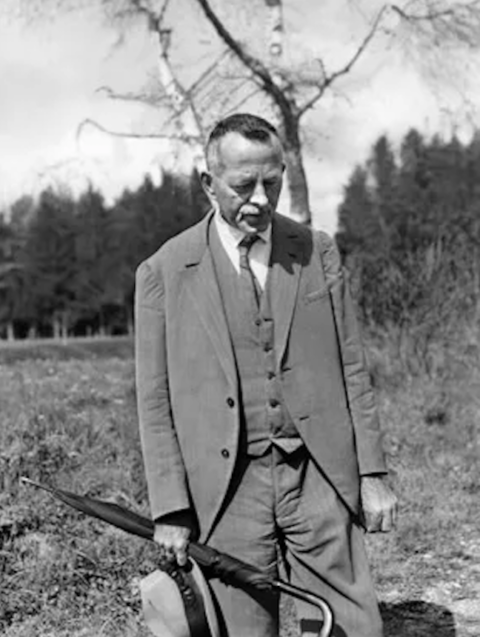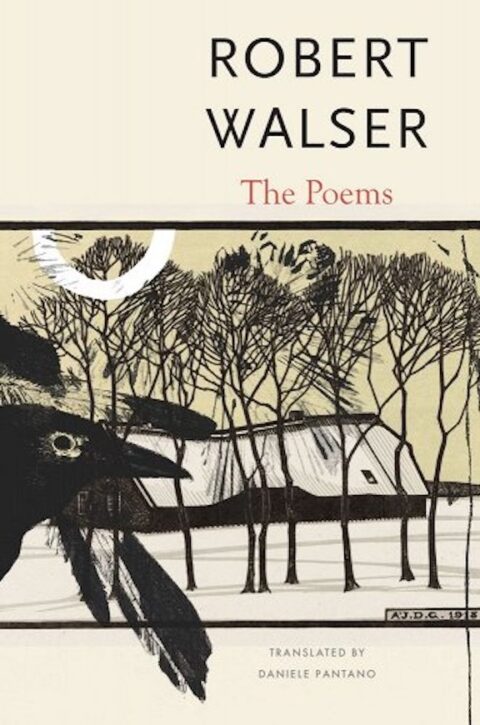 Admired by the likes of Kafka, Musil, and Walter Benjamin, and acclaimed “unforgettable, heart-rending” by J. M. Coetzee, Swiss writer Robert Walser (1878-1956) remains one of the most influential authors of modern literature. Walser left school at fourteen and led a wandering, precarious existence while producing poems, stories, essays, and novels. In 1933, he abandoned writing and entered a sanatorium, where he remained for the rest of his life. “I am not here to write,” he said, “but to be mad.”
Admired by the likes of Kafka, Musil, and Walter Benjamin, and acclaimed “unforgettable, heart-rending” by J. M. Coetzee, Swiss writer Robert Walser (1878-1956) remains one of the most influential authors of modern literature. Walser left school at fourteen and led a wandering, precarious existence while producing poems, stories, essays, and novels. In 1933, he abandoned writing and entered a sanatorium, where he remained for the rest of his life. “I am not here to write,” he said, “but to be mad.”
The eight poems to follow here, included in the first publication of Walser’s collected poems translated for anglophones, allow readers to experience the author as he regarded himself at the beginning and end of his literary career — as a poet.
/ / / / /
Onwards
I wanted to stand still,
I urged myself further,
past black trees,
but beneath black trees,
I wanted to suddenly stand still,
I urged myself further,
past green meadows,
but next to those green meadows,
I only wanted to stand still,
I urged myself further,
past needy little cottages,
beside one of those cottages,
I really wanted to stand still,
regarding its need,
and how the smoke gently
rises into the sky, I would
like to stand still now awhile.
That’s what I said and laughed,
the green of the meadows laughed,
the smoke rose smiling like smoke,
I urged myself further.
* * * * *
Too Philosophical
How ghostly my life
in its fall and rise.
Always I see myself waving to myself,
floating away from the one waving.
I see myself as laughter,
as deep mourning again,
as a wild weaver of talk;
but all this falls away.
And all this time it has
never been quite right.
I have been chosen to
wander forgotten distances.
* * * * *
Doll
Please look at me for once,
do you not find me dignified?
I am a doll, I have very
interesting eyes that are
only made of glass and thus
are not good for much.
My limbs are full of sawdust.
Walking is simply impossible,
sitting works somewhat better,
and I am very good at lying down.
I have never done any work,
my hands are way too stiff,
my lips remain forever sealed,
they have never uttered a word,
my voice has never been heard.
Dolls are silent like fish.
I cannot laugh or cry.
Pain and joy, hate and love
I let people deal with,
who as we know get
emotional only too quickly.
I am always at the mercy
of some kind of change,
I am never frightened,
nothing unsettles me,
I feel, think, sense nothing
at all and I am apathetic
quite in the extreme.
To startle dolls out of their
sleep is hardly possible.
You see me constantly
making the same strange face.
I have never had a soul,
affection is utterly alien to me,
I am a sort of phenomenon
when it comes to immutability,
what a disgraceful confession!
Is a doll a doll
because of its liveliness?
I am based on, maintained
by illusion, simple as that.
Children appreciate me;
to them I am in every way
more than welcome as a plaything,
they can busy themselves with me,
because they have imagination.
Adults, on the other hand,
most certainly feel that
they are superior to me.
There is a reason for this,
of course, as I am generally
speaking unbelievably unhelpful.
To act on my own is something
that would never cross my mind,
I am utterly dependent
on the support of others.
There is plenty of evidence
that I am unusually
lifeless, stiff and dry.
To a child’s mind, however,
I am absolutely alive,
I eat, drink, go on walks,
lie down in bed just like a real person
and charm them with my talk;
and all this is only imagined,
and can easily add this
and that imaginary thing.
O, the little ones are so much
smarter than the big ones think.
It is they who know how to live.
* * * * *
The Comfort of Complaining
No one should feel abandoned,
yet I think there are many who
imagine themselves to be alone.
Here I live like a child enchanted
by the idea that I have been forgotten.
Perhaps there are only a few of us who can
bounce back in this way. Everywhere, I say,
there is some sun and wind and shadows
and sparkling moments of happiness
and sorrow swooping down on the soul
like an eagle from the heights of humanity.
Of course, people forget each other
quickly, but I believe everyone
is to blame for the fact
that those who were forgotten
were forgetful themselves.
To complain about something so natural
has a certain comfort sometimes.
* * * * *
The Benefits of Talking
Whatever we can talk about to one another,
our watchful eyes have seen it already.
Talking tries hard to be good for something,
and that talk replaces a world for us.
* * * * *
To a Writer
Gladly I would like to read the book
you wrote with your most earnest soul.
My so very funny stories are beginning
to bother me quite a bit, so to speak,
because I am afraid that they have made
many a reader dreary, dull and dead.
You, for example, never laughed it up;
you have always stepped in front of your
readership with the same solemn face,
they heard you pray with a devout voice,
and you gave courage and comfort to the world.
Because I was being funny with my quill,
some kind of remorse, if you know what I mean,
weighs on me, and that is why I would like
to delve into your work’s assiduousness;
I am light-heartedly writing poem after
poem, while you are serious, and that is why
you are probably the better and more dignified
man, and all of the funny things I have written
so far are making me sombre; you too are
one of those who cannot really stand me.
While reading your book, I feel like, now
that spring has returned with leaves and flowers,
comparing myself to your way of doing things.
* * * * *
Self-Reflection
Because they did not want me to be young, I became young.
Because I should have been a sufferer, many pleasures
flattered me.
Because they tried their best to put me in a bad mood,
I sought and found ways into such moods more welcome than
I could ever have wanted.
Since they impressed fear on me, courage cheered and laughed
with me.
They abandoned me, so I learned to forget myself,
which allowed me to bathe myself in blissfulness.
When I lost much, I realized that losses are winnings,
because no one can find something he did not first lose,
and to discover what is lost is worth more than any safe
possession.
Because they did not want to know me, I became self-aware,
became my own understanding and friendly doctor.
Because I found enemies in my life, I attracted friends,
and friends dropped away, but enemies too stopped being
hostile,
and the tree that bears the most beautiful fruits of luck is called
misfortune.
On life’s path, we lift all the peculiarities given to us
by our birth, our family home and our schools,
and only those who could not help but strain themselves need
to be rescued.
No one who is content with himself ever needed help,
unless he happened to be in an accident and needed to be
carried to the hospital.
* * * * *
I Wish I Had
I wish I had not yet written all those things,
there being nothing more to say on my part.
I wish someone here would help me be funny,
sometimes I feel ill-humoured on this earth.
If I had only drunk coffee instead of two glasses
of beer, there could still be hope for this poem,
which is being written now and so very smoothly,
even though it is unspeakably silent around me,
I could not wish for a more undisturbed silence,
even though I perhaps could allow myself something else.
I do not know whether I should have eaten sausage today
rather than cheese and whether I can still save this little poem,
which seems broken to me. As Herman Hesse
is known to do sometimes, I make a face like an idiot.
Admittedly, I wish I had not just said that,
it does not seem very elegant to me,
but now I will sleep long, until the next day.
/ / / / /
 We are indebted to Seagull Books for their permission to excerpts these selections from Robert Walser: The Poems, translated by Daniele Pantano. You can acquire a copy of this splendid collection from Bookshop.org by clicking here.
We are indebted to Seagull Books for their permission to excerpts these selections from Robert Walser: The Poems, translated by Daniele Pantano. You can acquire a copy of this splendid collection from Bookshop.org by clicking here.
The poems:
“Onwards,” written 1899/1900, from Gedichte (1909)
“Too Philosophical,” from Gedichte (1909), first published in the Wiener Rundschau (1899)
“Doll,” written in Biel 1919-1920, first published in Die Rheinlande (1919)
“The Comfort of Complaining,” written in 1930, originally titled “The Comfort of Forgetting,” unpublished.
“The Benefits of Talking,” written in 1930, unpublished.
“To A Writer,” first published in Prager Presse, 1933.
“Self-Reflection,” written in 1925, first published in Prager Presse, 1933.
“I Wish I Had,” written in 1928, first published in Die literarische Welt, 1928